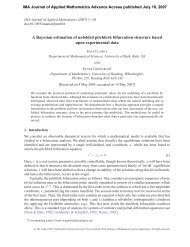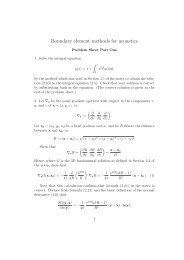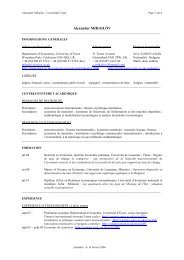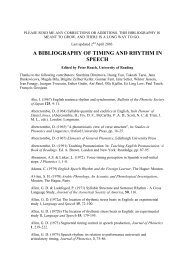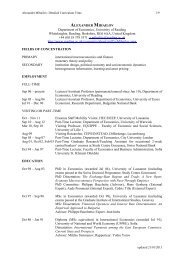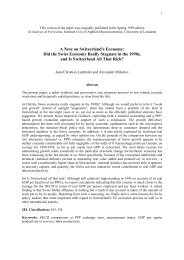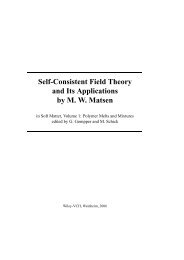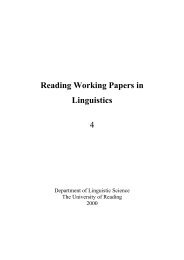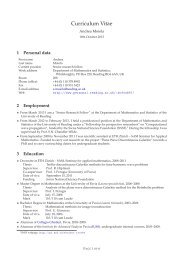On-line Processing of Articles and Clitic Pronouns by Greek ...
On-line Processing of Articles and Clitic Pronouns by Greek ...
On-line Processing of Articles and Clitic Pronouns by Greek ...
You also want an ePaper? Increase the reach of your titles
YUMPU automatically turns print PDFs into web optimized ePapers that Google loves.
Published in: Franich, K., Iserman, K, & Keil, L. (2010). (Eds.). Proceedings <strong>of</strong> the 34 th<br />
Annual Boston University Conference on Language Development, Volume 1,<br />
78-89.<br />
position <strong>and</strong> they are licit under certain circumstances in the object position<br />
(Marinis, 2003). <strong>Clitic</strong> pronouns, on the other h<strong>and</strong>, can be used only in the<br />
object position <strong>and</strong> can be omitted in the case <strong>of</strong> object-drop, rendering them<br />
less frequent. They constitute verbal arguments which are optional produced<br />
under specific discourse conditions, <strong>and</strong> they have a more complex derivation<br />
than definite articles (Mavrogiorgos, 2010).<br />
In light <strong>of</strong> the grammatical properties <strong>of</strong> articles <strong>and</strong> clitic pronouns in<br />
<strong>Greek</strong>, Tsimpli & Stavrakaki (1999) proposed the Interpretability Hypothesis<br />
(IH), a domain-specific account. According to the IH, the uninterpretable<br />
features carried <strong>by</strong> the definite article <strong>and</strong> the clitic pronoun should constitute a<br />
vulnerable acquisition domain for children with SLI, at least at the initial stages<br />
<strong>of</strong> acquisition, leading to incomplete underlying representations <strong>and</strong> impaired<br />
access to these representations. Conversely, the indefinite article which carries<br />
semantic information <strong>and</strong> interpretable features associated with [-definite] is not<br />
predicted to be impaired.<br />
3. Acquisition <strong>of</strong> articles <strong>and</strong> clitic pronouns <strong>by</strong> <strong>Greek</strong> TD children <strong>and</strong><br />
children with SLI<br />
In typical acquisition, definite articles emerge in the speech <strong>of</strong> <strong>Greek</strong><br />
children at around the age <strong>of</strong> 1;9 when their MLU is below 2; they are<br />
felicitously produced in more than 90% <strong>of</strong> the time in obligatory contexts when<br />
their MLU is above 2.5 <strong>and</strong> their age is around 2;5 to 2;9 (Marinis, 2003). <strong>Clitic</strong><br />
pronouns appear shortly after definite articles, around the age <strong>of</strong> 2;1. After a<br />
short period <strong>of</strong> clitic omission which coincides with object omission, children<br />
reach target-like production (Marinis, 2000). The early acquisition <strong>of</strong> clitics in<br />
<strong>Greek</strong> has also been highlighted in the experimental study <strong>by</strong> Tsakali & Wexler<br />
(2003) which investigated 25 older TD children (2;4-3;6) <strong>and</strong> found clitic<br />
omission <strong>of</strong> less than 1% in obligatory contexts. This is in contrast with results<br />
from Romance languages, in which clitics emerge quite late in both typical <strong>and</strong><br />
atypical acquisition <strong>and</strong> TD children show an extended period <strong>of</strong> clitic omission<br />
even until the age <strong>of</strong> 4 years (Jakubowicz & Nash, 2006).<br />
Turning now to the acquisition <strong>of</strong> articles <strong>and</strong> clitics <strong>by</strong> <strong>Greek</strong> children with<br />
SLI, there is evidence that definite articles <strong>and</strong> clitic pronouns show a high rate<br />
<strong>of</strong> omission in pre-school children with SLI, whereas indefinite articles <strong>and</strong><br />
strong pronouns seem to be intact (Diamanti, 2000; Tsimpli & Stavrakaki, 1999;<br />
Varlokosta, 2000). However, the rate <strong>of</strong> omission <strong>of</strong> both definite articles <strong>and</strong><br />
clitic pronouns varies considerably from study to study. For example, Tsimpli &<br />
Stavrakaki (1999) reported 95% omission <strong>of</strong> definite articles <strong>and</strong> 97% omission<br />
<strong>of</strong> clitic pronouns in a 5;5 year old child with SLI, whereas Mastropavlou<br />
(2006) reported 40% omission <strong>of</strong> clitic pronouns in ten preschool children aged<br />
4;2-5;9.<br />
In addition, several studies have shown age <strong>and</strong> therapy effects in the<br />
acquisition <strong>of</strong> definite articles <strong>and</strong> clitic pronouns. For example, Stavrakaki<br />
(2001) showed that a group <strong>of</strong> eight older children with SLI with a mean age <strong>of</strong>



